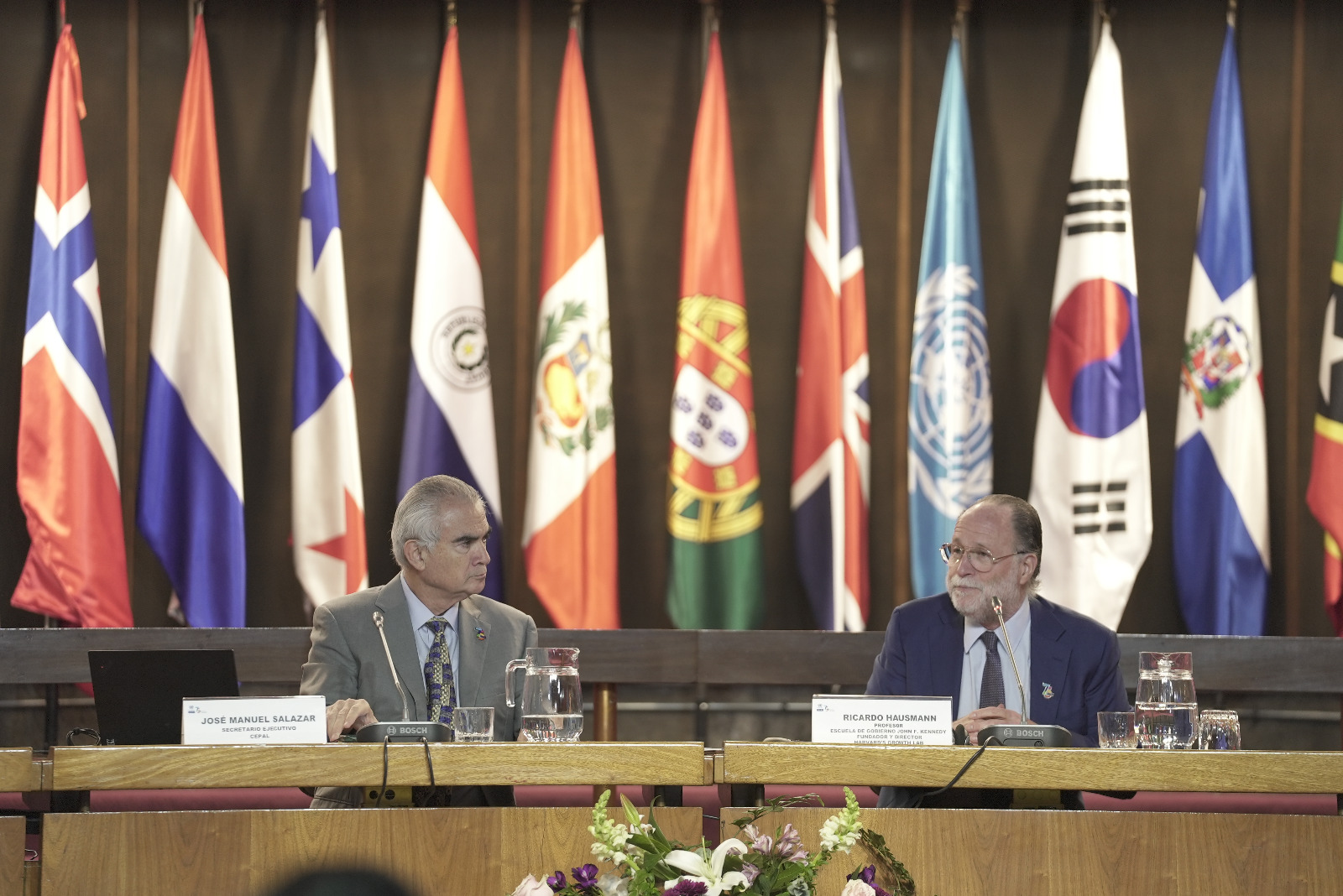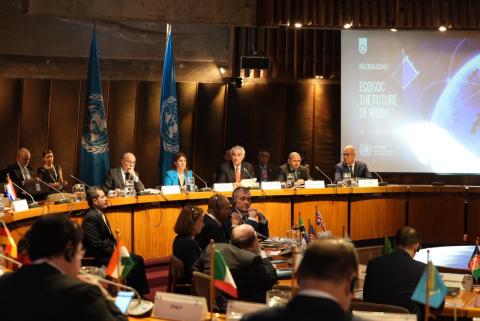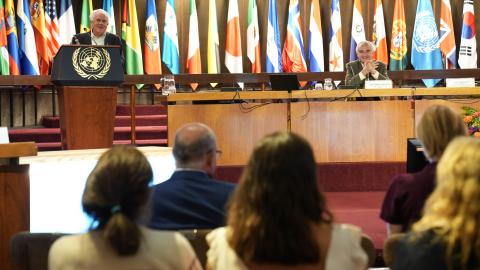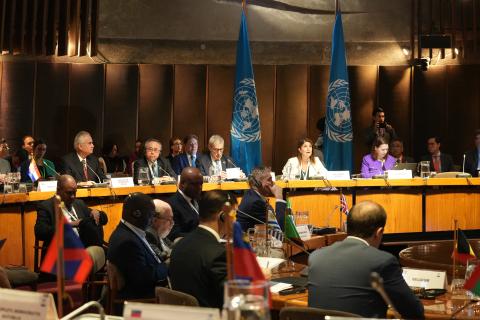News
The prominent economist and Professor at Harvard’s John F. Kennedy School of Government, Ricardo Hausmann, highlighted today the relationship between technology, knowledge, productive development and inequality in economies, in a keynote lecture given at the main headquarters of the Economic Commission for Latin America and the Caribbean (ECLAC) in Santiago, Chile as part of the Keynote Lecture Series organized to commemorate the United Nations regional commission’s 75th anniversary.
Hausmann, who is also the founder and Director of Harvard University’s Growth Lab, was received by José Manuel Salazar-Xirinachs, Executive Secretary of ECLAC, where he gave a lecture entitled “How can high, sustained, sustainable and inclusive growth be achieved?”
At the start of his presentation, Hausmann thanked ECLAC for the invitation and recognized the historical importance of the institution, “which has been fundamental in generating Latin American economic thought,” he stated.
In his lecture, the John F. Kennedy School of Government Professor analyzed the development gaps that many countries exhibit in relation to the United States. “In the last 40 years, developing countries have narrowed gaps in education, urbanization, employment and even investment vis-à-vis the United States. But the income gap has not narrowed. On the contrary, in Latin America and the Caribbean, this gap has widened in the last decade. This is because total factor productivity has been diverging on a large scale,” he indicated.
Ricardo Hausmann explained that “technology” is actually productive knowledge that we use to transform the world, and it can be divided into three areas: incorporated knowledge, codified knowledge and tacit knowledge. “This technology is what enables us to do certain things, and based on that we can develop a theory of inequality and explain the difficulty of making public policy in that space, all of this in a context in which the world wants to decarbonize,” he said.
He added that technology needs public goods. “For example, a car requires highways, stoplights, traffic police, etc. to be able to work. But public goods don’t have ‘the market’s invisible hand’ to organize them. The State does not have this mechanism as a means of coordination. That is why the production of public goods can get complicated when it does not have all the information, resources or incentives,” he warned.
“If productive development requires public goods, then they must be provided. And they must be supplied by smart institutions with a purpose, centered in clusters, with productive choices and with green chapters,” he emphasized.
With regard to the problem of inequality, Hausmann indicated that a critical part of this is inequality in productivity, meaning inequality in income generation. “Redistribution is not the same as inclusion. We must invest in including people in the networks that would enable them to be productive. So, must they be compensated for their exclusion? Inclusion is costly, there must be a budget for it, and that budget cannot be ‘empty’ due to everything being allocated to redistribution,” he stressed.
In his welcome remarks, ECLAC’s Executive Secretary, José Manuel Salazar-Xirinachs, thanked Hausmann for being present and described him as “one of the most important economists and thinkers on economic development in our time.”
“The theme of your keynote lecture on “How can high, sustained, sustainable and inclusive growth be achieved?” comes at a time that could not be more opportune or relevant for a region that, as we have been saying at ECLAC, is sick with low growth, and not because of the cascade of shocks that has battered us since the pandemic, but from prior decades. A low-growth disease that we are called upon to cure, because if it continues, we are not going to be able to reduce poverty, informality and inequality, nor to create quality jobs,” the United Nations senior official indicated.
“As we all know, Ricardo Hausmann is one of the economists who has contributed the most to rethinking productive development policies, the causes of low productivity, and about how the development process is largely a process of learning to do more technologically sophisticated things or, as he has expressed it, a process of making the economic complexity of production systems denser. And with a world in the midst of several accelerated technological revolutions, and pressured by energy, climate and other transitions, this topic is more important than ever,” Salazar-Xirinachs underlined.
“It is a topic in the strategic reflections we have been making with renewed energy at ECLAC in recent months, regarding the major growth and productivity challenges that the region’s countries face, and the need to intensify efforts on policies for sustainable and inclusive productive development,” he added.
The organization’s Executive Secretary indicated that at ECLAC “we have been insisting on the need to substantially escalate the degree of ambition and the efforts that our countries have been making on productive development policies, understood as those aimed directly at fostering that major productive transformation of our economies as a vehicle for increasing productivity and that include sectoral efforts in sectors that drive growth through cluster initiatives, public-private partnerships, development of solid business ecosystems around new technologies, a big push towards sustainability – and all of this complemented by greater investment in education and human talent, infrastructure, innovation and in quality institutions in charge of these matters.”
He explained that ECLAC has not only sought to guide countries and their territories about what to do, but particularly on the “hows” behind productive development policies. “Part of these ‘hows’ are related to the way in which we organize and align the various actors, efforts and resources at different levels – national and subnational – under these policies. Which is to say, they are related to governance for productive development,” the organization’s highest authority specified.
“The region is facing an important challenge on how to implement its productive development policies. Which is why we at ECLAC are ready and eager to accompany national and subnational governments in designing and implementing these efforts,” José Manuel Salazar-Xirinachs concluded.
ECLAC’s Keynote Lecture Series began on July 24 with a presentation by Arancha González Laya, Dean of the Paris School of International Affairs (PSIA) at the Paris Institute of Political Studies (Sciences Po), while August 18 marked the turn of prominent Colombian economist and former ECLAC Executive Secretary, José Antonio Ocampo. Subsequently, on September 4, Aloizio Mercadante, President of the Brazilian Development Bank (BNDES), gave a presentation on “The role of development banks in the transformation of the Latin American development model.” In this series taking place through February 2024, other prominent thinkers will visit the Commission’s headquarters in Santiago to present their views and ideas about the challenges facing the world and the region. The full list of lecturers is available here.



